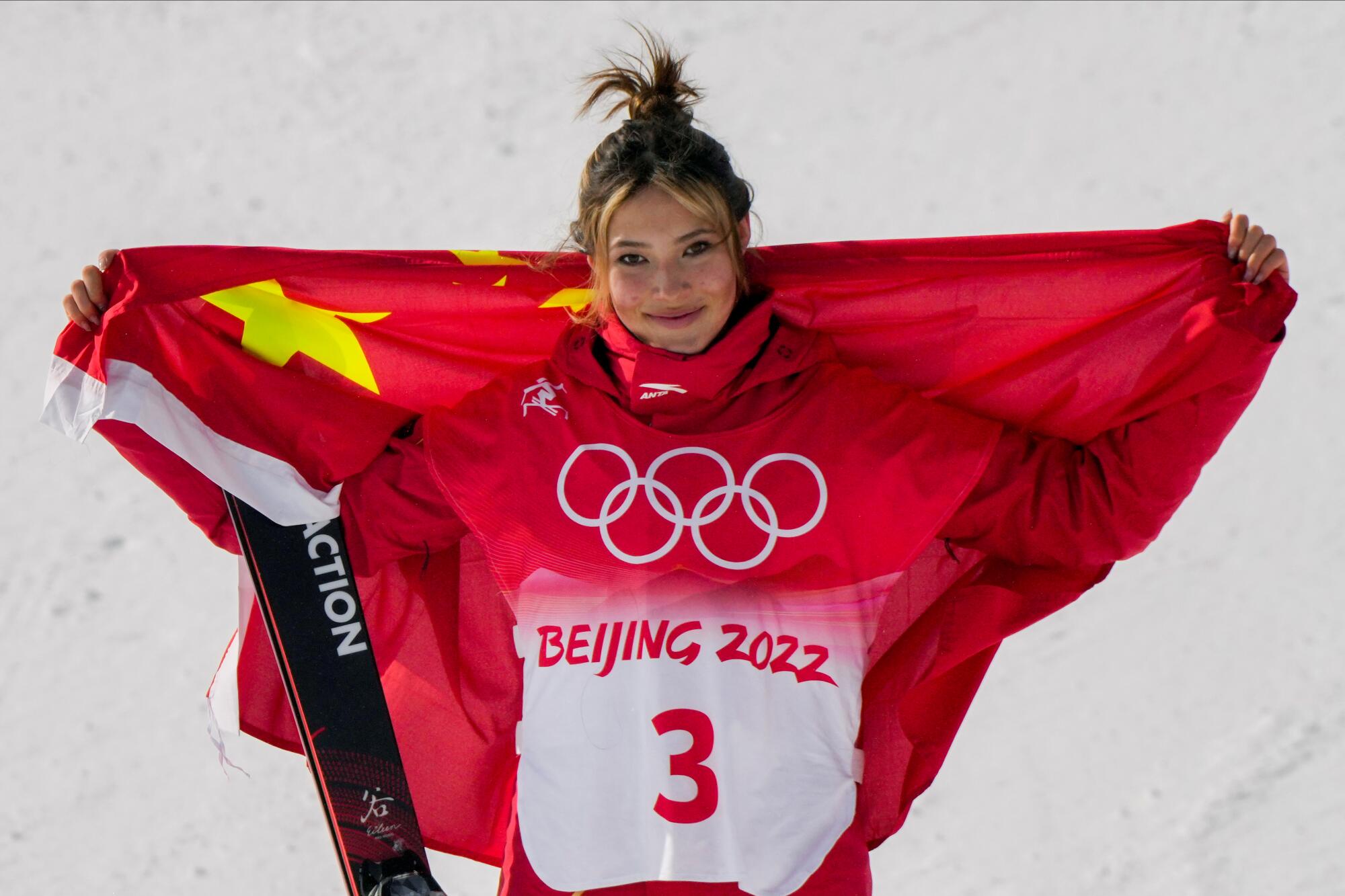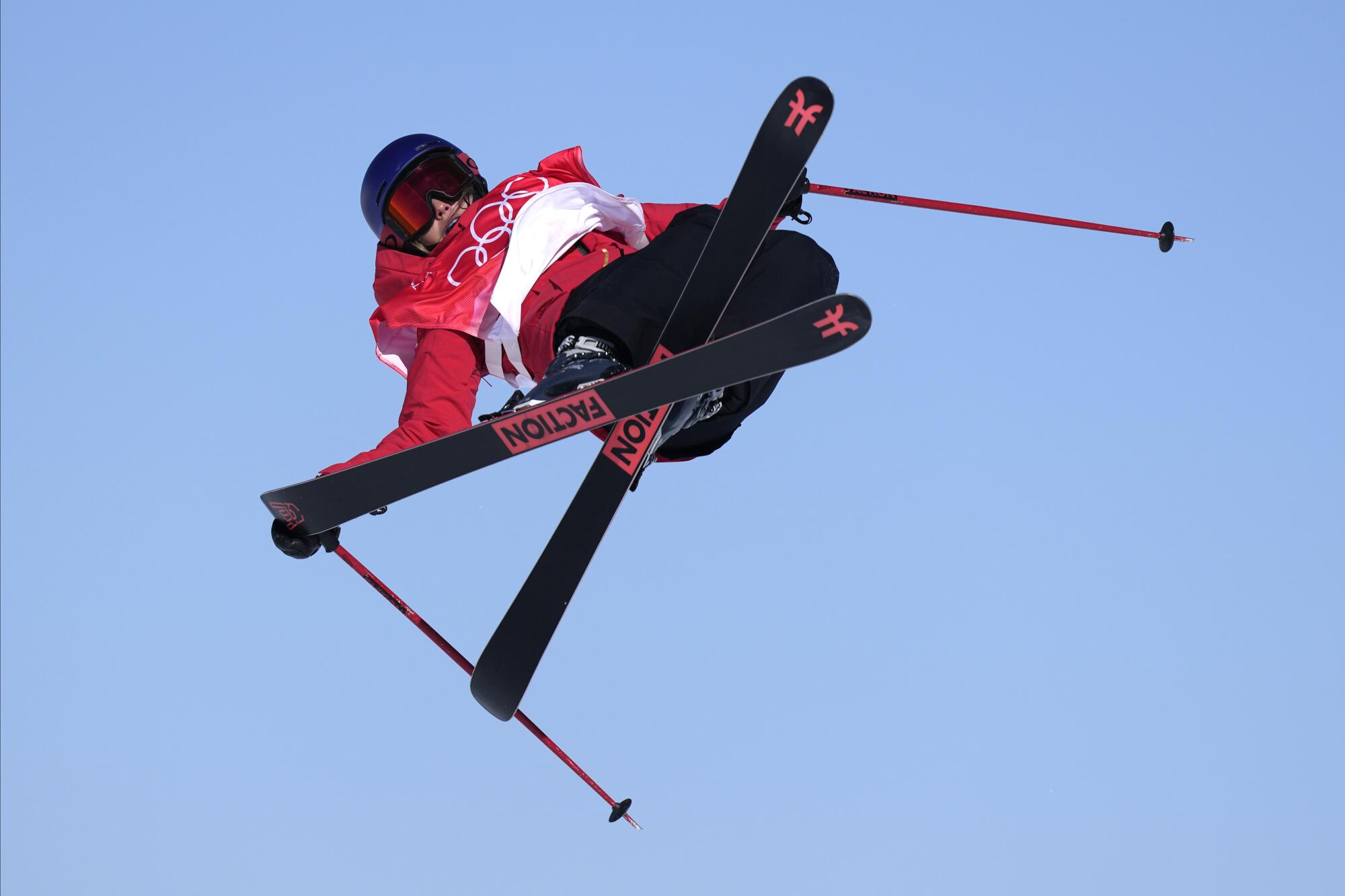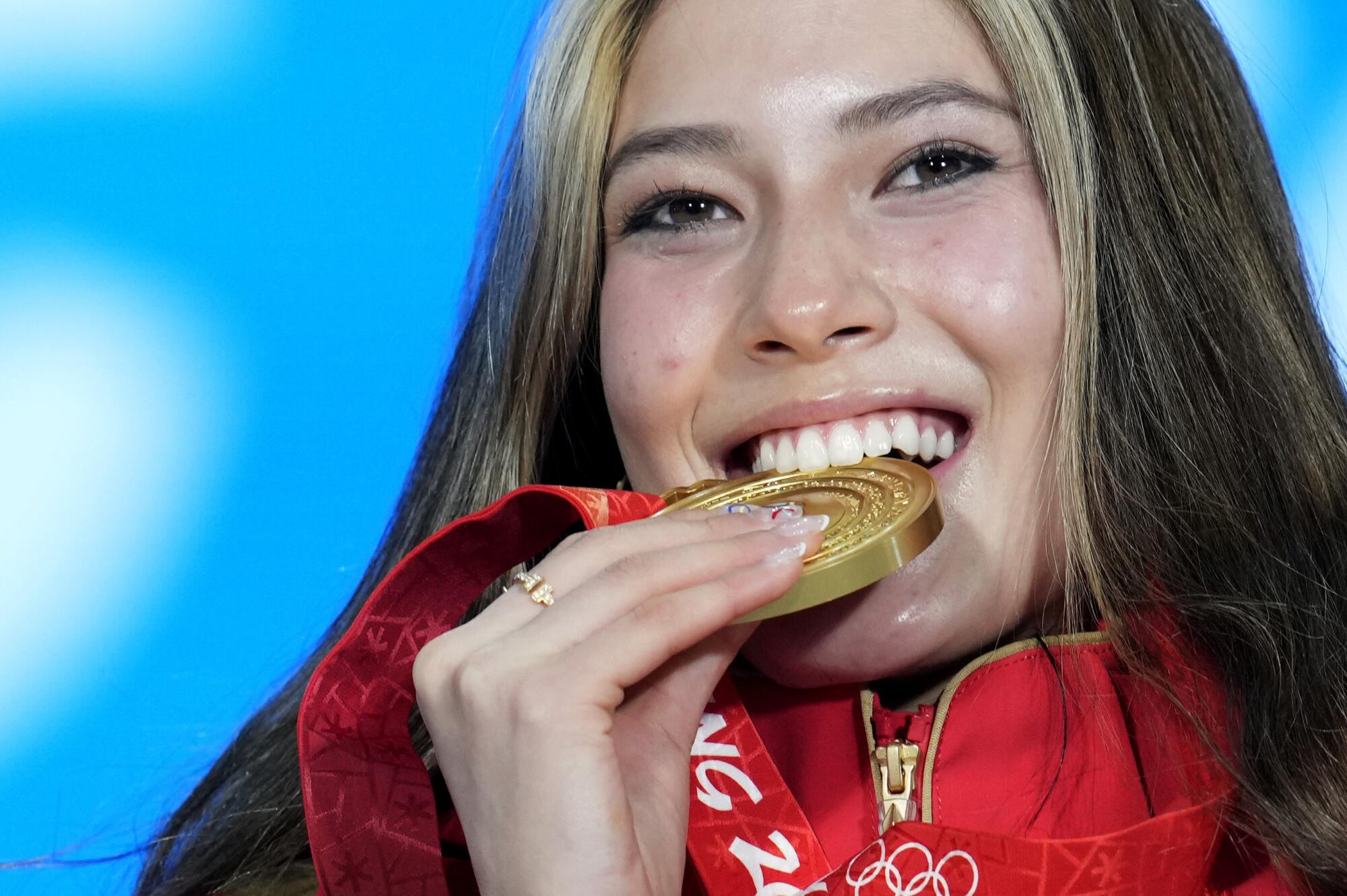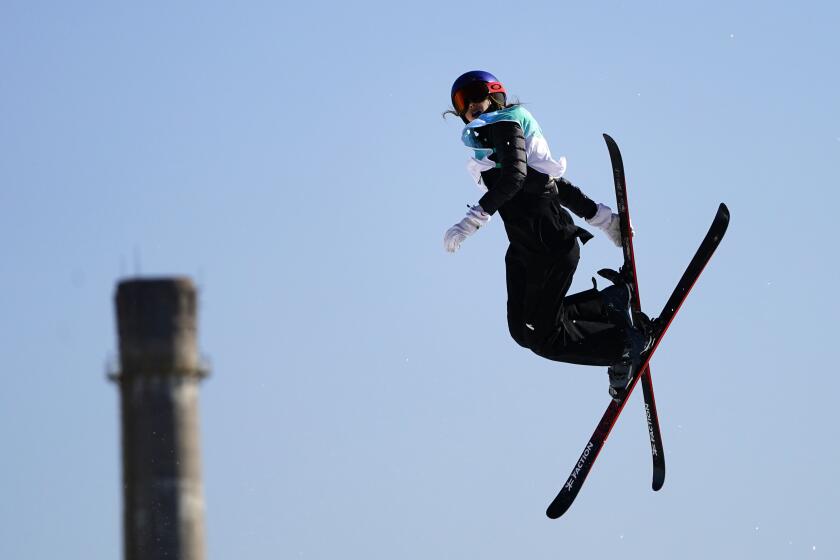
BEIJING â In one Winter Olympics sweep, Eileen Gu has solidified her place as one of the biggest sports stars in the world, not to mention one of the most politically divisive.
The California native has won two medals competing for China and is going for a third in the womenâs freestyle skiing halfpipe on Friday, known to be her best event. But Guâs success comes in tandem with a highly controversial Winter Games and an increasingly strained relationship between China and the U.S., directly challenging her insistence that sports, and her skiing career, are apolitical.
Gu, 18, has posted win after win in international competition ahead of the Olympics. Sheâs currently one of the most visible athletes in China and beyond, having appeared in fashion magazines and represented Chinese and American brands including Red Bull, Louis Vuitton and JD.com.
In her Olympic debut, Gu vaulted ahead of her competitors in the final run of the womenâs freestyle skiing big air with a double 1620, cinching gold with a trick she had never performed in competition or practice. She made another last-minute comeback in her second event, snagging silver in slopestyle and finishing less than a point short of first place.
Strict COVID-19 protocols have limited access to ceremonies and competitions and muted the excitement and economic boost the Olympics usually draw.
As her profile has risen, Gu has confronted questions that put her on the spot in the growing U.S.-China divide. Reporters asked for her comments on Chinese tennis star Peng Shuai, who accused a high-ranking Chinese official of sexual assault on social media then vanished from public view. Her disappearance fueled concern about her well-being and renewed calls for the U.S. to boycott the Olympics. Peng later denied making the accusation, and was seen attending Guâs first Olympic event.
âIâm really grateful that sheâs, yeah, happy and healthy and out here doing her thing,â Gu said of Peng.
Gu was also asked to address a flood of online scorn toward Olympic figure skater Zhu Yi, another U.S.-born athlete competing for China who fell during an earlier performance. As Chinese viewers attacked her for her background as well as her mistake, Zhu became another symbol of the baggage that comes with being caught between the two superpowers. Gu praised Zhuâs abilities and added âmistakes and pressure are all a part of sports.â
Itâs not unusual for an athlete to be born in one country then make the decision to compete under another flag. But China does not recognize dual nationality for Chinese citizens, and Guâs decision has come under particularly intense scrutiny. Reporters have repeatedly questioned whether she still holds U.S. citizenship, their interest heightened by Guâs evasive answers.

While an answer one way or another wonât change the competition, it could tip the scales of public opinion in either of the countries Gu is trying to court, said Mark Dreyer, author of âSporting Superpower: An Insiderâs View on Chinaâs Quest to Be the Best.â And if Gu has been allowed to retain both nationalities, it could incur anger over special treatment.
âI understand why sheâs doing it, but I also understand why people are not particularly happy about it and crying foul,â he said. âItâs almost impossible to play both sides these days given the political situation.â
Her status as an Olympic gold medalist, fashion model and incoming Stanford freshman aside, Gu insists that sheâs just like anyone else. Sheâs comfortable in her athletic prowess, but modest when it comes to being too much more.
âAm I an international superstar?â she asks half breathless in disbelief, in response to a question about her growing celebrity. She laughs with the crowd: âI canât even imagine it.â
Chinese star Eileen Gu, 18, won gold in the inaugural womenâs freestyle skiing competition before a home crowd Tuesday at the Winter Olympics.
Poised and well-spoken, Gu sounds the most rehearsed when sheâs rattling off answers sheâs given hundreds of times â about her aspirations to pave the way for young female athletes, her cultural fluency in straddling two ethnic identities, or her decision in 2019 to compete for her motherâs home country of China. Other moments feel more spontaneous â recounting a back-and-forth with her mother, swiping on her phone to show reporters the gold medal sheâs been manifesting on her home screen â highlighting the natural charisma thatâs attracted so many of her supporters.
âSorry â the picture of the cat on your phone is so cute, I also have an orange cat,â she blurts out in the middle of a press huddle. âI got him from Shanghai and he looks like that. Sorry.â
Known to her Chinese fans as Gu Ailing, sheâs endeared herself through her embrace of local culture, effortlessly dropping references to her fondness for dumplings, red-braised pork, meat buns and Peking duck. The TV tower she saw atop the Big Air Shougang structure is the same one that she sees from her Beijing home, she told reporters in both Mandarin and English after winning her first medal there.
âIâm just trying to listen to the positive ... and to ignore the hate, because they donât know what theyâre talking about.â
— China freestyle skier Eileen Gu
âIt really feels like Iâm competing at my own doorstep,â she said.
At the Beijing Nanshan Ski Resort where Gu trains, about 50 fans gathered to watch Gu win gold last week as the club broadcast the event across 10 TVs and one big screen. âAt first we were all anxious,â said Wang Haijia, head of events and new media at the resort. Once it became clear that Gu had won, viewers cheered enthusiastically and pumped fists in the air.
One spectator at the resort, Lian Lian, found herself close to tears. The 26-year-old, who started skiing about five years ago and uses Gu-branded skis, laughed a bit at the idea that she looks up to someone several years younger than herself. But beyond the appeal of Guâs natural athletic talent, Lian said sheâs also drawn to her calls to women to pursue the things that they enjoy.
âBefore skiing, I didnât have anything that I was passionate about,â she said. âBut now I can say I really love skiing.â

Though Gu is widely loved in China â social media users obsess over everything from her sleep schedule to her travel aspirations â she can still risk alienating fans. Her claim to relatability was recently undermined by an assertion that VPNs, or virtual private networks used to circumvent Chinaâs internet censors, are widely available in China. For some social media users, the comment highlighted the privilege her American upbringing has afforded her.
Hu Xijin, the former editor in chief of the Communist Party tabloid Global Times, also warned against attaching too much nationalistic sentiment to Guâs Olympic success. On Weibo, Chinaâs Twitter-like platform, Hu wrote that how Gu determines her nationality in the future is still uncertain, and that the worsening of U.S.-China relations could make being âAmerican in America and Chinese in Chinaâ difficult to realize.
Recapping the news, results and highlights from The Timesâ team of reporters who covered the 2022 Beijing Olympic Games.
Despite Guâs attempts to retain impartiality, the discourse surrounding her is emblematic of the widening rift between the two sides that she represents, both of which want to claim her for their own. U.S. detractors have criticized Gu for turning her back on her home. Chinese fans have delighted at Guâs retorts when challenged on her Chinese affiliation, echoing her own words on TikTok, âCry ab it,â as a catchall rejoinder to American jealousies.
âSports and politics and business are connected, in China perhaps more than anywhere else,â Dreyer said. âYou try to separate those three strands and you cannot. And I think she represents this perfectly.â
For Gu, who has fended off such questions since her first win and still has another gold medal in her sights, handling criticism and pressure are challenges sheâs already well accustomed to.
âI would be lying if I said I was 100% good at ignoring 100% of all the messages that I get,â Gu said. âIâm just trying to listen to the positive, to feel the support, to take the pressure off of myself, and to ignore the hate, because they donât know what theyâre talking about.â
More to Read
Go beyond the scoreboard
Get the latest on L.A.'s teams in the daily Sports Report newsletter.
You may occasionally receive promotional content from the Los Angeles Times.










